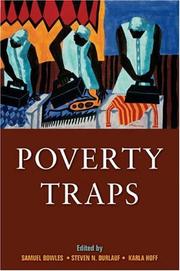| Listing 11 - 20 of 20 | << page >> |
Sort by
|

ISBN: 0631195769 Year: 1995 Publisher: Oxford Blackwell
Abstract | Keywords | Export | Availability | Bookmark
 Loading...
Loading...Choose an application
- Reference Manager
- EndNote
- RefWorks (Direct export to RefWorks)
Book
ISBN: 0198287984 Year: 1993 Publisher: Oxford Oxford University Press
Abstract | Keywords | Export | Availability | Bookmark
 Loading...
Loading...Choose an application
- Reference Manager
- EndNote
- RefWorks (Direct export to RefWorks)
Book
Year: 2009 Publisher: Cambridge, Mass. National Bureau of Economic Research
Abstract | Keywords | Export | Availability | Bookmark
 Loading...
Loading...Choose an application
- Reference Manager
- EndNote
- RefWorks (Direct export to RefWorks)
Equality can multiply due to the complementarity between wage determination and welfare spending. A more equal wage distribution fuels welfare generosity via political competition. A more generous welfare state fuels wage equality further via its support to weak groups in the labor market. Together the two effects generate a cumulative process that adds up to an important social multiplier. We focus on a political economic equilibrium which incorporates this mutual dependence between wage setting and welfare spending. It explains how almost equally rich countries differ in economic and social equality among their citizens and why countries cluster around different worlds of welfare capitalism---the Scandinavian model, the Anglo-Saxon model and the Continental model. Using data on 18 OECD countries over the period 1976-2002 we test the main predictions of the model and identify a sizeable magnitude of the equality multiplier. We obtain additional support for the cumulative complementarity between social spending and wage equality by applying another data set for the US over the period 1945-2001.
Book
ISBN: 9524551764 Year: 2001 Publisher: Helsinki United Nations University. World Institute for Development Economics Research
Abstract | Keywords | Export | Availability | Bookmark
 Loading...
Loading...Choose an application
- Reference Manager
- EndNote
- RefWorks (Direct export to RefWorks)
Article
Year: 2003 Publisher: Namur : Facultés universitaires Notre-Dame de la Paix [= FUNDP, Namur], faculté des sciences économiques et sociales,
Abstract | Keywords | Export | Availability | Bookmark
 Loading...
Loading...Choose an application
- Reference Manager
- EndNote
- RefWorks (Direct export to RefWorks)
Book
Year: 2022 Publisher: Cambridge, Mass. National Bureau of Economic Research
Abstract | Keywords | Export | Availability | Bookmark
 Loading...
Loading...Choose an application
- Reference Manager
- EndNote
- RefWorks (Direct export to RefWorks)
In this article, we document and discuss salient features of collective bargaining systems in the OECD countries, with the goal of debunking some misconceptions and myths and revitalizing the general interest in wage setting and collective bargaining. We hope that such an interest may help close the gap between how economists tend to model wage setting and how wages are actually set. Canonical models of competitive labor markets, monopsony, and search and matching all assume a decentralized wage setting where individual firms and workers determine wages. In most advanced economies, however, it is common that firms or employer associations bargain with unions over wages, producing collective bargaining systems. We show that the characteristics of these systems vary in important ways across advanced economies, with regards to both the scope and the structure of collective bargaining.
Book
Year: 2003 Publisher: Namur Facultés universitaires Notre-Dame de la Paix
Abstract | Keywords | Export | Availability | Bookmark
 Loading...
Loading...Choose an application
- Reference Manager
- EndNote
- RefWorks (Direct export to RefWorks)


ISBN: 0691125007 0691170932 9786613291035 1283291037 1400841291 9780691125008 9781400841295 9780691125007 Year: 2011 Publisher: Princeton, NJ
Abstract | Keywords | Export | Availability | Bookmark
 Loading...
Loading...Choose an application
- Reference Manager
- EndNote
- RefWorks (Direct export to RefWorks)
Much popular belief--and public policy--rests on the idea that those born into poverty have it in their power to escape. But the persistence of poverty and ever-growing economic inequality around the world have led many economists to seriously question the model of individual economic self-determination when it comes to the poor. In Poverty Traps, Samuel Bowles, Steven Durlauf, Karla Hoff, and the book's other contributors argue that there are many conditions that may trap individuals, groups, and whole economies in intractable poverty. For the first time the editors have brought together the perspectives of economics, economic history, and sociology to assess what we know--and don't know--about such traps. Among the sources of the poverty of nations, the authors assign a primary role to social and political institutions, ranging from corruption to seemingly benign social customs such as kin systems. Many of the institutions that keep nations poor have deep roots in colonial history and persist long after their initial causes are gone. Neighborhood effects--influences such as networks, role models, and aspirations--can create hard-to-escape pockets of poverty even in rich countries. Similar individuals in dissimilar socioeconomic environments develop different preferences and beliefs that can transmit poverty or affluence from generation to generation. The book presents evidence of harmful neighborhood effects and discusses policies to overcome them, with attention to the uncertainty that exists in evaluating such policies.
Poverty. --- National wealth --- Social stratification --- Social problems --- Poverty --- 330.56 --- 330.56 Nationaal inkomen. Volksinkomen. Gezinsinkomen. Vermogensstratificatie. Particuliere inkomens en bestedingen. Armoede. Honger --- Nationaal inkomen. Volksinkomen. Gezinsinkomen. Vermogensstratificatie. Particuliere inkomens en bestedingen. Armoede. Honger --- Destitution --- Wealth --- Basic needs --- Begging --- Poor --- Subsistence economy --- Economic history. --- Economic conditions --- History, Economic --- Economics
Book

ISBN: 9780691220208 Year: 2020 Publisher: Princeton, NJ
Abstract | Keywords | Export | Availability | Bookmark
 Loading...
Loading...Choose an application
- Reference Manager
- EndNote
- RefWorks (Direct export to RefWorks)
Book

ISBN: 9780231527651 Year: 2013 Publisher: New York, NY
Abstract | Keywords | Export | Availability | Bookmark
 Loading...
Loading...Choose an application
- Reference Manager
- EndNote
- RefWorks (Direct export to RefWorks)
| Listing 11 - 20 of 20 | << page >> |
Sort by
|

 Search
Search Feedback
Feedback About UniCat
About UniCat  Help
Help News
News